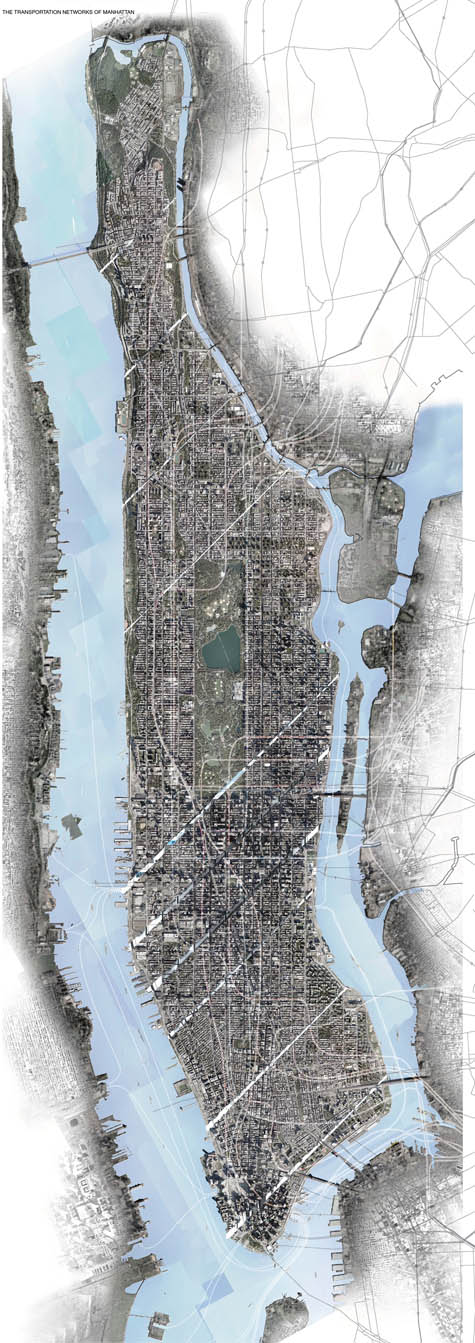 [Image: From Manhattan’s Annex by W. Amanda Chin. View larger].
[Image: From Manhattan’s Annex by W. Amanda Chin. View larger].
There are a few student projects from my trip the other week to Rice University that I’m going to be posting here over the next week or so – beginning with Manhattan’s Annex: The Crosstown [of] Excess by W. Amanda Chin.
For her thesis project at Rice, Chin proposed ten “waterscrapers” that would slice across the urban space of Manhattan, cutting through buildings, through parks, and through the urban grid itself, forming strange aquatic intersections with the city.
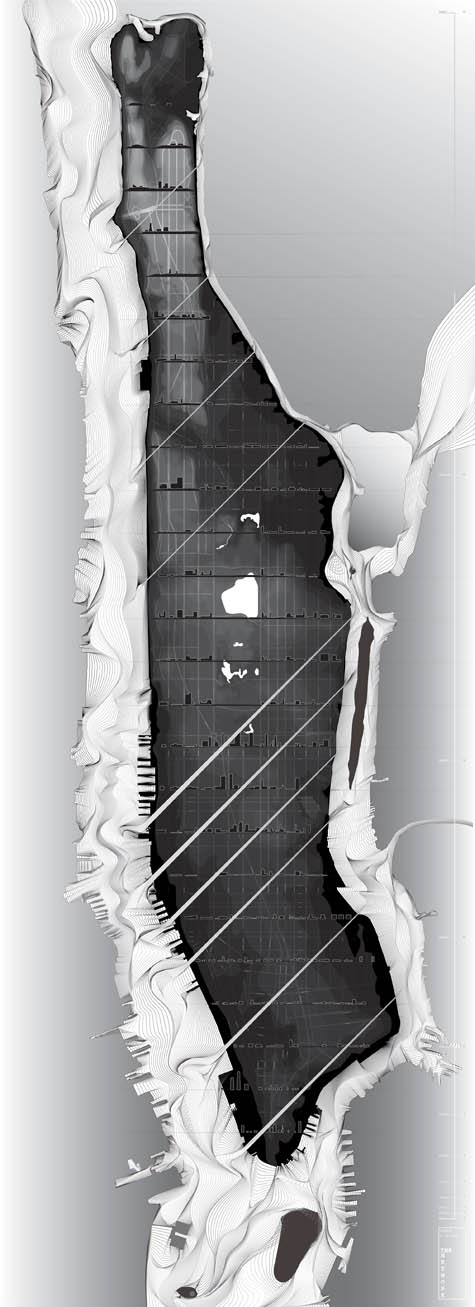 [Image: From Manhattan’s Annex by W. Amanda Chin. Image slightly cropped: view larger].
[Image: From Manhattan’s Annex by W. Amanda Chin. Image slightly cropped: view larger].
Inside would be routes for scuba-diving, new aquariums, and multi-seasonal sites for public swimming.
These above-ground pipes of water – like hydro-boulevards, or one might say the hydrological Haussmannization of Manhattan – are less an actual proposal for construction than a sort of architectural dream: the city cross-cut by amniotic utopias through which people can wander at all hours of the day.
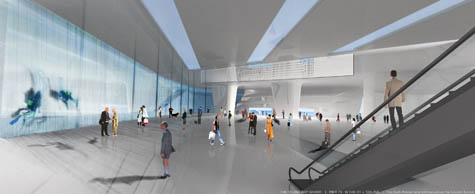
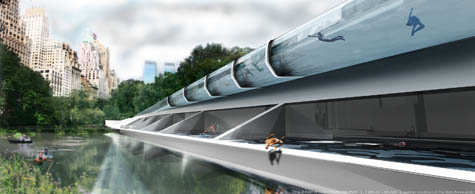
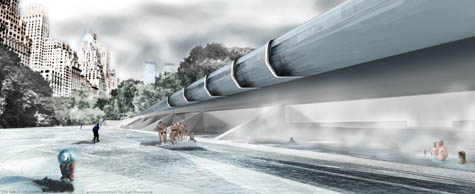
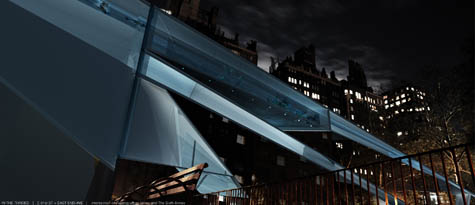 [Images: From Manhattan’s Annex by W. Amanda Chin; view larger].
[Images: From Manhattan’s Annex by W. Amanda Chin; view larger].
As you can see in the short comic strips that accompanied the project – see the larger Flickr set for more – the project is themed around overlapping idea of excess, self-indulgence, and addiction, as if these Voluntary Prisoners of Architecture-like scenes might be therapeutic, a mass psychotherapy of space.
It’s 3am and you’re depressed; you can’t sleep. You go out wandering across Harlem, inside one of the Annexes, completely alone, not a single other person in sight – when a group of people goes scuba-diving over your head. As if they’ve attained flight through an artificial river in the sky.
In a city of insomniacs, the city itself becomes the dream.
See more: Manhattan’s Annex: The Crosstown [of] Excess by W. Amanda Chin.
Re: second image – what’s happening around the edges? Those swirly contours.
This project reminds of (from your archives) Velo-City. N.B. The 5th comment from the bottom. 🙂
I’ve always liked that comment, actually. Quoting the original, from Alex Trevi:
“Why not fill it with water? An aquarium in the sky. A deep oceanic riverine current but on stilts and theter. Watch eels slithering their way through the interlocking tubular loop-de-loop-de-whoop. Or a pack of migrating humpback whales — the latest leg on their Darwinian odyssey…from sea to land then back again and finally to the skies. And if the entire structure collapses, well…back to land again in a sort of Douglas Adams fantasia. And why not some bioluminescent hatchetfishes, twinkling in the night sky where stars have long been blotted out by urban light pollution. Surely a very romantic evening can be had under the the shimmering Aquarium in the Sky. Until…of course…a 40-ton humback whale comes plunging down.”
beautiful madness
I thought this was going to be about harnessing hydro-power/microgeneration. It’s entirely possible, I think, especially at certain times of day, because the Hudson flows generally south (though it is also, of course, tidal, but the East River is entirely tidal — what flows into it from streams etc. is insignificant. So each of these cross-streams could have a little water turbine. But I wonder if you couldn’t instead just put a big turbine (or tidal capture plant) into the river: which would be more efficient?
If everyone would remeber that the water isn’t blue… maybe only at the côte d’azue in france…
i’m guessing the rest of the world hasn’t seen this uk advert then…
There actually have been turbines in place near Roosevelt Island generating tidal power for the past few years as part of a pilot project. I’m not sure how successful its been.
Very sci-fi, but the idea of actually being inside that thing makes me claustrophobic. Of course, I don’t know how to swim either. I guess it’s safe to assume that Ms. Chin is an avid swimmer or diver?
Really isn’t this on old idea presented by Groening in his animated series on “New New York” called “Futurama” aired on Fox?
Wouldn’t it have been a more pertinent exploration to investigate these waterways given sea level and lower manhattan’s inevitable flooding?
or nyc could just build a few more long overdue crosstown subway lines in manhattan. eh, either of these.